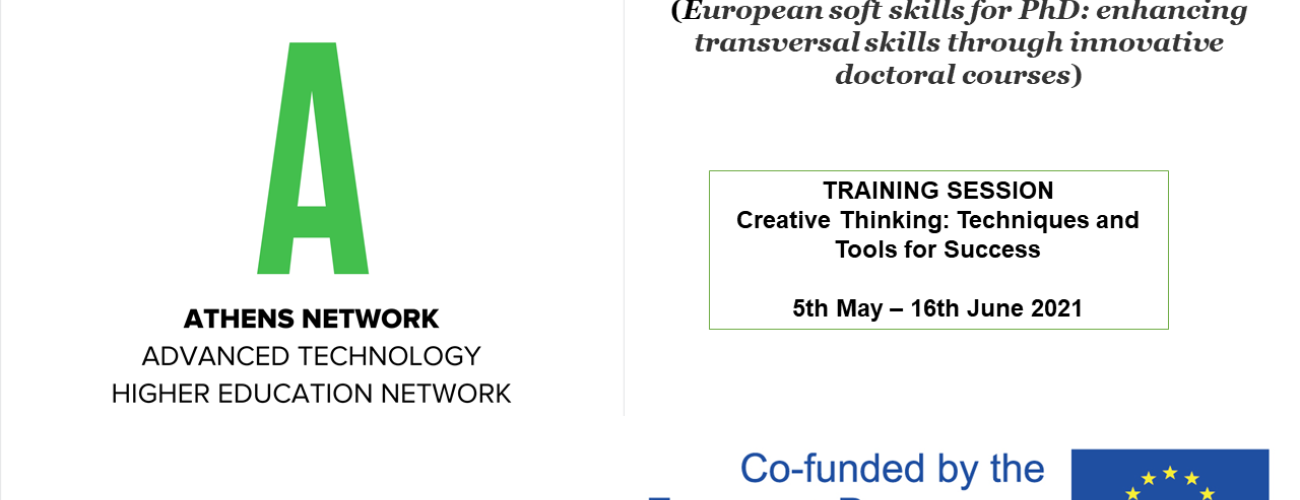
1st IDEAL training session: Creative Thinking: Techniques and Tools for Success
30/04/2021
The IDEAL consortium organises its first training session « Creative Thinking :Techniques and Tools for Success » for doctoral candidates. The course will be delivered by Istanbul Technical University (ITU).
The course « Creative Thinking :Techniques and Tools for Success » will equip doctoral candidates with a ‘tool-box’, introducing doctoral candidates to a selection of behaviors and techniques that will augment their innate creativity. It will consist of 5 different modules and will focus on creativity tools. Instant case studies will be applied at every module to enhance the learning process.
This is going to be an interactive course. Evaluation of their course will be done based on student participations. The doctoral candidates have to prepare and share this homework with the group.
The course will be taught by Sezi Çevik Onar, Associate Professor of Industrial Engineering at Istanbul Technical University (ITU).
Course description
This course will equip you with a ‘tool-box’, introducing you to a selection of behaviors and techniques that will augment your innate creativity. It will consist of 5 different modules and will focus on creativity tools. Instant case studies will be applied at every module to enhance the learning process.
Sub-modules/courses
1. Introduction to the Principles of Creativity: In the first module, we concentrate on the basic principles of creativity and highlight its importance in undertaking dynamic and global changes. The levels of creativity, namely lower and higher-level creativity will be introduced to the doctoral candidates.
Learning outcomes: Doctoral candidates will be able familiar with the basic concepts of creative thinking
2. Creativity Tools: In this module, we will focus on how we can increase our creativity using different methods such as grid brainstorming, six thinking hats, morphological analysis etc. This creativity tools have various aims including solving a stated problem to accumulate different ideas in an area. We are going to revisit the principles in addition to application of the various creativity tools both at an individual level and in the group level. We will consider different educational, professional and personal situations, that will enable doctoral candidates to improve their skills on the use of creativity tools.
Learning outcomes: Doctoral candidates will be able to understand, evaluate and apply different types of creativity tools in their own PhD context.
3. TRIZ - the Theory of Inventive Problem Solving: In this module, we focus again on improving doctoral candidates’ confidence, elasticity and novelty of idea generation by presenting a different creativity tool named TRIZ. We will mainly concentrate on applying TRIZ and the TRIZ Contradiction Matrix to different areas. At an individual and in group level, we will show how to apply TRIZ at problem solving.
Learning outcomes: Doctoral candidates will be able to apply TRIZ method at problem solving.
4. SCAMPER: In this module, we will teach the last creativity tool in this course. We will try to explain the role of SCAMPER in creating new ideas and developing the current ones. The doctoral candidates will learn the notions of SCAMPER, Substitute, Combine, Adapt, Modify, Put to another use, Eliminate, Reverse.
Learning outcomes: Doctoral candidates will be able to apply SCAMPER method in different levels and different problems.
5. Combining creativity tools and enhancing creativity: As the last step, since the doctoral candidates have learned different creativity tools and established skills in their utilization over different problems and areas, we will aggregate them by demanding doctoral candidates to use different tools in combinations and apply these in different problems in their research area.
Learning outcomes: Doctoral candidates will be able to improve their research question by the creativity concepts, tools and techniques that they gained in this course.
Course Schedule
1. Introduction to the Principles of Creativity
May 5th 10.00-12.00&13.00-15.00
2. Creativity Tools
May 19th 10.00-12.00&13.00-15.00
3. Creativity Tools
May 26th 10.00-12.00&13.00-15.00
4. Scamper and TRIZ methods
June 9th 10.00-12.00&13.00-15.00
5. Combining creativity tools, Student Homework Presentations
June 16th 10.00-12.00&13.00-15.00
5 Modules
Total 20 hours (5 days, 4 hours)
Learning outcomes for each module
(2 doctoral candidates from each university) (10-15 doctoral candidates)
On-line learning
Evaluation
%50 participation, %50 homework with the presentation and instant case studies
Delivery method
On-line. This course is completely based on readings, video reviews, independent and group assignments. There will be an instant case study after every module and a summative final project will be required. The list of assignments for every module will be available.
Technical requirements
To participate in this course, doctoral candidates will need the following resources: High-speed Internet access with a standard up-to-date browser. Consistent and reliable access to their e-mails. Doctoral candidates should be able to use their webcams, audio systems.
Expectations
Log-in Frequency: Doctoral candidates must actively check their e-mails.
Participation: Doctoral candidates are expected to actively engage in all course activities throughout the course, which includes viewing all course materials, completing course activities and assignments, and participating in course discussions and group interactions. Doctoral candidates should be able to share their screens and their faces during the class.
Registration
IDEAL partners are French ParisTech engineering schools (AgroParisTech, Arts et Métiers, Chimie ParisTech - PSL, MINES ParisTech - PSL), ENSTA Paris, Télécom Paris and four European Universities of Science and Technology : Universidad Politécnica de Madrid (UPM) - Spain, Politecnico di Milano (POLIMI) - Italy, University of Lisbon/Instituto Superior Técnico (IST) – Portugal and Istanbul Technical University (ITU) – Turkey, which are already partners in the ATHENS network. Coordinator is MINES ParisTech - PSL.

